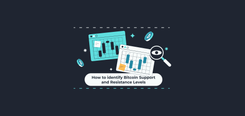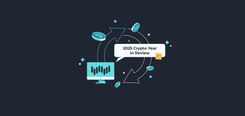A decentralized exchange (DEX) is a cryptocurrency trading platform which allows traders to exchange crypto tokens using smart contracts — without a middleman or centralized authority.
Unlike a traditional centralized exchange, sometimes known as a CEX, a DEX relies completely on code and algorithms to execute cryptocurrency token swaps.
How Does a DEX Work?
Decentralized exchanges (DEXes) are a relatively new form of cryptocurrency exchange which allow traders to swap cryptoassets without any third party handling the transaction.
This is the key aspect of a DEX which gives it its name — crypto trading becomes a process handled in a distributed manner, just like the difference between paying someone in fiat at a bank and sending them Bitcoin (BTC).
DEXes enable decentralized anonymous crypto trading via the use of smart contracts — pieces of code which decide if and when an agreement between two parties may be executed. Smart contracts fulfill the role of a backend on traditional exchanges — they only allow a trade to execute if the conditions of the agreement behind that trade are met.
A DEX can use different types of apparatus to manage orders — some, for example, even use traditional order books, just like those found on a CEX. Most, however, use an algorithm-based setup known as an automated market maker (AMM).
As of 2023, DEXes allow crypto traders to transact with each other in a practically anonymous manner, saving on fees and other pitfalls commonly encountered on traditional crypto trading platforms. While the sector continues to improve technologically, DEXes themselves are not without their problems, as users must entrust their financial security to automated mechanisms, and should something go wrong, there is no single human party to appeal to.
Order Book DEXes
Just like a traditional financial (TradFi) or crypto exchange, some DEXes employ an order book to handle trades.
This does not mean that there is no difference between those DEXes and CEXes; rather, a DEX order book matches trades and does not force users to deposit funds to an in-house exchange wallet. As such, users remain in control of their funds.
Within order book DEXes, there are two types of order book: on-chain and off-chain. As its name suggests, the latter involves trades which occur outside the blockchain, and these are then synced, or settled, on-chain at a later date. The reason for the existence of off-chain order books, among others, is that they tend to be much more efficient — trades require fewer gas fees (in the case of Ethereum tokens), something which can make a sizeable difference to trade profitability in and of itself in times when Ethereum network fees are unusually high.
Automated market makers (AMMs)
The most common type of DEX trade settlement system, and arguably the one which offers the best compromise between security, efficiency and ease-of-use, is the automated market maker or AMM.
AMMs are algorithmic processes which match trades on a DEX based on its liquidity pool — the collection of tokens available. In essence, they fulfill the role that an order book and in-house accounts otherwise would on a CEX.
An AMM adheres to a strict set of rules which keeps the balance of liquidity on a DEX stable, while also taking care of pricing. There are several types of AMM which use different algorithmic functions to fulfill different DEX requirements.
As an example, in the case of a “constant product” AMM, the less of asset A there is, the more expensive it becomes relative to other assets, and vice versa. The AMM achieves this using a relatively simple formula: X*Y=K. This means that a perfect ratio of value between two cryptocurrency tokens is maintained, regardless of how many of each respective token there are.
The complex task of repricing cryptoassets on an exchange is handled in a highly efficient manner by algorithmic AMMs using basic principles of supply and demand.
DEX Aggregators
As DEXes become more popular as part of the general growth of DeFi, competition among them is stepping up. This is good for consumers, but comes with side effects — how does a trader know where to find the best price for a swap?
This is where DEX aggregators come in. Much like a search engine, a DEX aggregator sifts through offers for a specific pair across DEXes so that a trader does not have to do so manually.
In times of volatility or varying liquidity, this can be a game changer — low liquidity can dramatically impact swap rates between DEXes, and a trader could thus end up with a highly unsatisfactory price for a trade without the help of an aggregator.
DEX aggregators also allow split trading across multiple DEXes, further improving the overall price of trades.
The first and perhaps best-known DEX aggregator is 1inch, created during a hackathon in 2019 and continuing to develop since. The aggregator has adapted to factor in gas fees and transaction costs when displaying results, helping alleviate a common headache when it comes to DEX-based DeFi swaps.
What Are the Benefits of Decentralized Exchanges?
DEXes contain multiple key benefits for crypto traders versus traditional exchanges or “CEXes”.
As its name suggests, a DEX is a decentralized method of trading tokens which does not have a centralized core or third party handling trades. This is immediately appealing to crypto traders used to CEXes; a DEX can offer lower fees, faster transactions and leaves control of funds with the user.
Not having to rely on a third party is arguably the main reason for the creation of the DEX sector in the first place; crypto’s journey to the mainstream is littered with exchange failures, hacks and outright implosions.
While complete anonymity is far from guaranteed in crypto, DEXes nonetheless greatly reduce the level of data needed to complete a trade. The now-standard CEX requirements — passport data, a phone number, email address and other forms of user verification — are irrelevant when it comes to DEXes. This may change as the industry expands and DEXes appear on the radar of regulators, and some projects aiming to strike the necessary balance between privacy and anonymity already exist as of 2023.
How to Use Decentralized Exchanges
To use a DEX, traders need to download and fund a wallet which is appropriate for the specific network the DEX supports, for example, Ethereum.
Trading on a DEX means interacting with smart contracts, and it is important to make sure that the tokens for trading match the network the DEX uses.
Each underlying network will have its fees for moving tokens which use that network standard. In the case of Ethereum, this is Ether (ETH). Trading on an Ethereum DEX thus requires users to pay gas fees, meaning that ETH is required for transactions. Gas fees can vary significantly according to a variety of factors, and traders need to bear the potential transaction fee costs in mind when transacting.
Once operational the wallet will form the basis for using a DEX. Some have user-friendly interfaces and sync directly into a browser, and like standard crypto wallets come with a backup phrase or similar recovery seed.
Advantages and Disadvantages of Decentralized Exchanges

Advantages:
- DEXes can be faster, cheaper and more anonymous than traditional crypto exchanges. There are no roadblocks to transacting and no identification requirements.
- Similarly, the range of tokens available on DEXes can be much larger than on CEXes due to the lack of bureaucracy and vetting of projects required for the latter to list them.
- Not having to trust a third party means that on DEXes, users control their funds and do not have to submit them to an intermediary in the form of an exchange account.
- In the same way, smart contracts are written in code and their terms cannot be changed at the last minute or otherwise vetoed by a central authority that for whatever reason disapproves of a particular transaction taking place.
Disadvantages:
- As with any decentralized tool in crypto, the responsibility of using a DEX correctly lies with the user. As a nascent industry, DEXes remain comparatively technical, and can be confusing for users who already struggle with understanding how CEXes work.
- Technicalities can lead inexperienced traders to lose funds due to simple user error. Sending funds to the wrong network, falling victim to slippage during market volatility and failing to notice transaction fee amounts are all examples of common pitfalls while using DEXes.
- Sometimes, as on CEXes, volatility can lead to a surge in trading activity on a DEX, and the delay in confirming a transaction on its underlying blockchain can cause a trade to close at a different rate to that which was initially displayed. This is known as “slippage” and is a key factor to bear in mind for all DEX traders.
- In terms of security, the ease-of-access DEXes offer can see them harbor suspicious tokens which turn out to be scams. For more information on what these scams might look like, check out the TabTrader Academy articles on DeFi scams and rug pulls.
- Like tokens themselves, sometimes, smart contracts may contain exploitable bugs which end up costing traders money.
Exchanges of the Future
Decentralized exchanges are still in their infancy, but are already revolutionizing the crypto exchange space and how traders interact.
They are attempting to overcome the classic shortfalls of traditional exchanges, and to a large extent have succeeded — DEX trading can be faster, cheaper and more accessible than trading on a CEX.
Despite some problems due to their technical nature, it is safe to say that the majority of the “real” progress in DEX development is still to come.
TabTrader is making its own major contribution to the DEX scene by becoming the first multi-platform terminal to support trading on both centralized and decentralized exchanges. In addition to its current 30+ centralized exchanges, TabTrader will soon enable users to trade on Openbook, a decentralized exchange on the Solana blockchain, with more decentralized exchanges on different networks planned for the near future.
Expected to launch in Q2 2023, the DEX will support TabTrader’s in-house TTT token, and like the most popular DEXes require no KYC or sign-up procedures. Even a TabTrader account will be optional.
Meanwhile, learn all about cryptocurrency and how to trade it with the TabTrader Academy.




